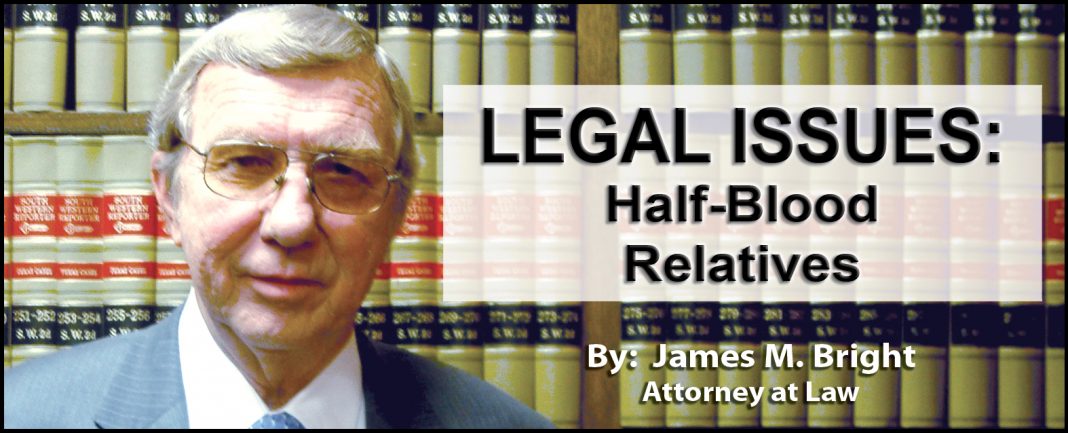The following is provided for informational purposes only and is not, nor should it be construed as legal advice.
In Texas law, half-blood relatives (also called collateral relatives) are those relatives who are neither descendents nor direct ancestors of the deceased person. Collateral relatives can include brothers, sisters, aunts, uncles, nieces, nephews, etc.
If a person dies without children as descendents, then the possibility of collateral relatives inheriting a part of his/her property comes into being.
One rule of intestate succession dictates that half-blood collateral relatives inherit only one-half as much as do whole-blood relatives.
A fact to example might be:
- Joe died without having any children during his lifetime and without being married.
- One of Joe’s parents (his father) predeceased Joe. His mother was still living, but in an elder care facility where inheritance from Joe will not change her quality of life at all.
- Joe’s father had three children: one prior to his marriage to Joe’s mother, who we shall call Faith, and then two with Joe’s mother who are Joe and his brother Mark.
- Joe was ill the last few years of his life, and his half sister, Faith, was his primary caretaker. Mark and Joe were not close and had not even spoken to each other since an argument when they were teenagers more than 50 years before the time of Joe’s death.
- Joe died without a Will and had an estate valued at approximately $100,000 at the time his death.
In determining how Joe’s estate passes because he had no Will, the rule regarding half-blood relatives comes into play. That rule, Estates Code art. 201.057, produces the following result for the distribution of Joe’s estate:
- In examining this estate, we look first to see if Joe had any lineal descendents which he did not.
- Because Joe had no spouse and no descendents, the law next looks to his parents as direct ancestors who are first in the line of distribution if they are living. In this case, one was living and one was not.
- Since his mother survived him along with his estranged millionaire brother Mark and his half-sister Faith (Joe’s caretaker for the last 12 years of his life), Joe’s $100,000.00 estate would be distributed as follows:
- $50,000.00 to Joe’s mother. (Joe had no descendants; therefore, his mother becomes an heir as the closest ascendant.)
- $33,333.34 to estranged brother Mark. (Because Joe and Mark had the same father and the same mother, they as brothers are directly related.)
- $16,666.67 to Joe’s half-sister, Faith. (Because Joe and Faith had the same father, but different mothers, they are only half-siblings.)
This rule concerning half-relatives can be very daunting and confusing to even the best of probate scholars, but all confusion can be avoided by a simple Will. You can imagine how complicated this distribution would become if the order of deaths was different. Example: what if Mother and Mark had predeceased Joe and Mark had five children who survived his death? The answer to that question is much too long for this article but has already been asked and answered in Texas case law.
A Will supersedes laws of intestate succession to let you decide how you want your property to pass after your death.
We cannot know what Joe might have wanted to happen to his estate because he did not have a Will. We do know that if he had a Will and wished to make his sister Faith’s life easier after his death as partial payment for the 12 years of care given him, he could have easily done so. Had he even done the simplest Will, his estate could have been diverted from his mother (who could not take advantage of the funds) and his estranged brother Mark (who not only does not need the money, but also probably would not be the person that Joe wanted to have benefit of it).
Don’t let the laws of intestate succession decide who your heirs are. In Harris and Montgomery Counties, we are fortunate to have many attorneys who can help you determine how your property will pass after your death. No matter how large or how small your estate is, you are encouraged to find an attorney of your choice and have him/her help you declare your intent.
James Bright has been admitted to practice before the Federal Courts for the Southern District of Texas and Eastern District of Texas as well as all of the Justice Courts, Probate Courts, County Courts at Law, District Courts, Courts of Appeal and Supreme Court for the State of Texas. He maintains an office in Houston and by appointment another at 208 McCown Street in the heart of historic Montgomery. Contact may be made by telephone (936) 449-4455 or (281) 586-8277. For more information about wills or probate in Texas, please see-www.houstontxprobate.com
IF YOU WISH TO SUGGEST A TOPIC FOR THIS COLUMN, SEND TO:
JAMES M. BRIGHT
14340 TORREY CHASE BLVD., SUITE 150
HOUSTON, TEXAS 77014
Email: [email protected]















